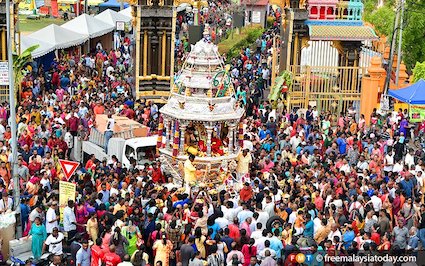I urged Hindus to pray at home to counter the Covid-19 pandemic

From P Ramasamy
I have recently observed that there is a certain degree of incongruity or dissonance on the issue of Covid-19 between the federal government and its relationship to state, district and local governments.
This incongruity gives the perception that a federal agency, such as the National Security Council (MKN), knows best when it comes to curbing the Covid-19 pandemic.
Once an agency, such as MKN, comes out with the standard operating procedures, it is expected that the lower levels of governments just have to implement them without asking questions.
The fact that the state, district and local level government might have better ideas of containing the pandemic probably never crossed the minds of those in the MKN.
The case of the Hindu religious festival, Thaipusam, best illustrates the dissonance between the know-it-all federal agency, MKN, and the state governments.
It was the Penang government that first announced the cancellation of the chariot processions for Thaipusam.
This was followed by Selangor and other states, a week before the MKN made the decision to cancel the annual chariot processions.
Unlike the MKN, the Penang government and the Hindu Endowments Board (HEB) took very strict measures in cancelling the Thaipusam events.
Events such as prayers in temples, chariot processions, different forms of kavadis, mass hair shaving, coconut breaking, and the installation of “panthals” and stalls were all disallowed.
Since Thaipusam spans three days, prayers have been barred but confined to the temple committees only.
The Penang Hilltop Murugan temple is making plans to live telecast the Thaipusam prayers.
In short, I have urged Hindus in Penang to pray at their homes to counter the Covid-19 pandemic.
The MKN in its initial circular on Thaipusam forbade chariot processions and other related events but allowed for milk Kavadi under strict SOP.
Even this we did not permit for Thaipusam in Penang.
But all of sudden, with less than one week to go for Thaipusam, MKN has made an about-turn on chariot procession.
It has made an exception for the Batu Caves Hindu temple (Sri Maha Mariamman Devasthanam) in allowing for a chariot procession with only 10 persons.
Why this double standard? Why allow chariot procession for the Batu Caves Hindu temple but not allow for other temples in the country.
If the MKN expects the people in this country to take the pandemic seriously, then it must be seen to be serious and a responsible agency.
With the rise in the Covid-19 cases, social and religious events must be controlled or regulated.
It cannot allow exceptions here and there to give the impression that we are not serious in flattening the pandemic curve.
Such an irresponsible attitude is not going to help in the containment of the pandemic.
It is not too late to rescind the latest directive, just because the Federal Territories Minister Annuar Muda made a special appeal on behalf of the irresponsible Batu Caves temple committee.
The inconsistency on the part of the MKN illustrates a larger problem that has been plaguing its over-centralisation for some time.
In other words, the MKN might not be really in touch with issues or matters at the state, district and local levels.
The top-down approach might be suitable during the early stage of the pandemic but not at the present serious stage.
The case of the Thaipusam festival best illustrates how the MKN simply failed to take account of the views or decisions at the state levels.
While the states wanted a tougher stand on the Thaipusam festival, the MKN without paying heed went ahead in allowing for certain events including the latest irresponsible decision to allow for a chariot procession from Kuala Lumpur to the Batu Caves temple.
P Ramasamy is deputy chief minister of Penang.

